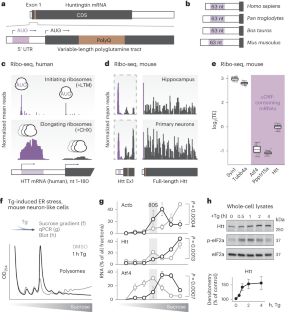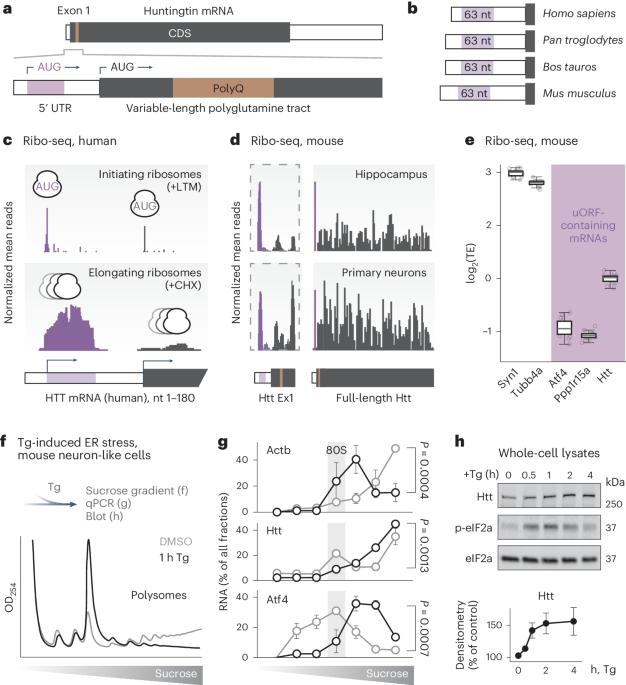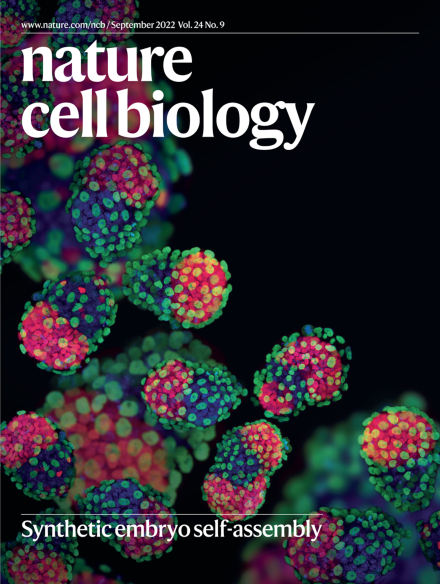Polyglutamine-mediated ribotoxicity disrupts proteostasis and stress responses in Huntington’s disease
IF 17.3
1区 生物学
Q1 CELL BIOLOGY
引用次数: 0
Abstract
Huntington’s disease (HD) is a neurodegenerative disorder caused by expansion of a CAG trinucleotide repeat in the Huntingtin (HTT) gene, encoding a homopolymeric polyglutamine (polyQ) tract. Although mutant HTT (mHTT) protein is known to aggregate, the links between aggregation and neurotoxicity remain unclear. Here we show that both translation and aggregation of wild-type HTT and mHTT are regulated by a stress-responsive upstream open reading frame and that polyQ expansions cause abortive translation termination and release of truncated, aggregation-prone mHTT fragments. Notably, we find that mHTT depletes translation elongation factor eIF5A in brains of symptomatic HD mice and cultured HD cells, leading to pervasive ribosome pausing and collisions. Loss of eIF5A disrupts homeostatic controls and impairs recovery from acute stress. Importantly, drugs that inhibit translation initiation reduce premature termination and mitigate this escalating cascade of ribotoxic stress and dysfunction in HD. Aviner et al. show that translation and aggregation of Huntingtin (HTT) are regulated by a stress-responsive upstream open reading frame. Mutant HTT depletes translation elongation factor eIF5A, leading to ribosome pausing and collisions.


多聚谷氨酰胺介导的核糖毒性会破坏亨廷顿氏病的蛋白稳态和应激反应
亨廷顿氏病(Huntington's disease,HD)是由亨廷廷(Huntingtin,HTT)基因中的 CAG 三核苷酸重复扩增引起的一种神经退行性疾病。虽然已知突变型 HTT(mHTT)蛋白会聚集,但聚集与神经毒性之间的联系仍不清楚。在这里,我们发现野生型 HTT 和 mHTT 的翻译和聚集都受上游应激反应开放阅读框的调控,而 polyQ 的扩展会导致翻译终止和释放截短的、易聚集的 mHTT 片段。值得注意的是,我们发现在有症状的 HD 小鼠大脑和培养的 HD 细胞中,mHTT 会消耗翻译延伸因子 eIF5A,从而导致普遍的核糖体暂停和碰撞。eIF5A 的缺失会破坏平衡控制,影响急性应激的恢复。重要的是,抑制翻译起始的药物可以减少过早终止,并减轻 HD 中这种不断升级的核糖毒性压力和功能障碍级联。
本文章由计算机程序翻译,如有差异,请以英文原文为准。
求助全文
约1分钟内获得全文
求助全文
来源期刊

Nature Cell Biology
生物-细胞生物学
CiteScore
28.40
自引率
0.90%
发文量
219
审稿时长
3 months
期刊介绍:
Nature Cell Biology, a prestigious journal, upholds a commitment to publishing papers of the highest quality across all areas of cell biology, with a particular focus on elucidating mechanisms underlying fundamental cell biological processes. The journal's broad scope encompasses various areas of interest, including but not limited to:
-Autophagy
-Cancer biology
-Cell adhesion and migration
-Cell cycle and growth
-Cell death
-Chromatin and epigenetics
-Cytoskeletal dynamics
-Developmental biology
-DNA replication and repair
-Mechanisms of human disease
-Mechanobiology
-Membrane traffic and dynamics
-Metabolism
-Nuclear organization and dynamics
-Organelle biology
-Proteolysis and quality control
-RNA biology
-Signal transduction
-Stem cell biology
 求助内容:
求助内容: 应助结果提醒方式:
应助结果提醒方式:


